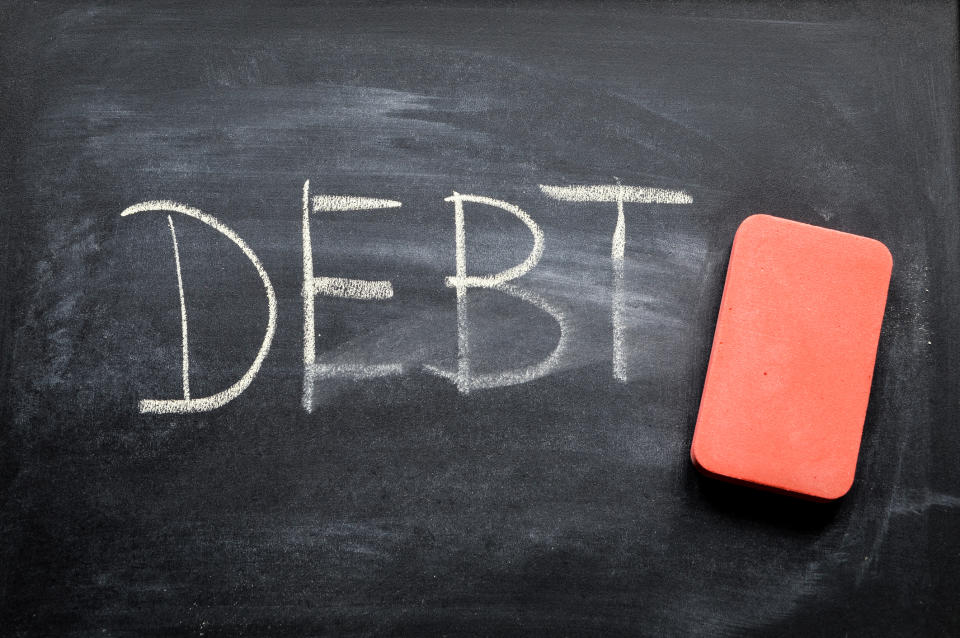As U.S. Debt Rate Rises, Auto Loan Delinquencies Hit Record High
If you live in America and you are in debt, you are definitely not alone.
The Federal Reserve Bank of New York just put out its latest quarterly report on U.S. household debt and found that Americans collectively owe about $13.54 trillion, an amount that has risen for 18 consecutive quarters and is 21% higher than the $12.7 trillion owed in 2008 during the height of the Great Recession.
Among the more troubling facts from the report is the record 7 million Americans who are 90 days or more behind on their auto loan payments. It's a signal, economists say, that Americans are struggling to pay bills despite other indications of a strong economy and low unemployment. Approximately 6.5% of all auto finance loans are 90-plus days past due.
Student loan debt edged higher, hitting $1.46 trillion in the fourth quarter, and serious delinquency rates in the category continue to be much higher than any other debt type.
Mortgage debt accounted for most of the total, hitting $9.12 trillion in the fourth quarter.

Total household debt in the U.S. hit $13.54 trillion in the fourth quarter of 2018. Image source: Getty Images
Other key takeaways from the report
Mortgage originations dropped to $401 billion from $445 billion, the lowest level in nearly four years. This is attributed to rising mortgage rates in the quarter.
Mortgage delinquencies were roughly flat (1.1% had mortgage balances 90-plus days late).
There were $144 billion in newly originated auto loans, continuing a nine-year growth trend.
Auto loan originations totaled $584 billion in 2018, the highest amount recorded in 19 years of collecting data.
Credit card balances rose by $26 billion to $870 billion.
About 195,000 consumers had a bankruptcy notation added to their credit reports, down 5,000 year over year.
What does this mean for the overall economy?
Despite the concerns in the auto-loan segment, Americans were generally less eager to boost their debt in late 2018. Credit inquiries hit a new low in the history of the Fed survey, driven largely by a decline in refinancing requests. This is good news generally, but it could also signal potential trouble for consumer spending, which accounts for more than two-thirds of U.S. economic activity.

Source: Federal Reserve Bank of New York report
The Fed report made sure to note that the overall level of auto loan credit quality actually improved, with less-worthy borrowing declining to 22% of the total share while 30% is now held by those on the higher end of the scale. But the rise in delinquencies is cause for concern.
"The substantial and growing number of distressed borrowers suggests that not all Americans have benefited from the strong labor market," noted economists in a blog the New York Fed produces. The report said there were more than a million "troubled borrowers" at the end of 2018 -- when unemployment was 4% -- compared to 2010 (10% unemployment).
A rise in auto-loan defaults is unlikely to cripple the entire financial system as mortgages did in the run-up to the 2008-2009 financial crisis. The total auto-loan market is just over $1 trillion, compared to $12 trillion for housing.
"Auto loan originations for 2018 reached an all-time high in our dataset and the growth has been driven by creditworthy individuals," said Joelle Scally, Administrator of the Center for Microeconomic Data at the New York Fed. "Despite auto debt's increasing quality, its performance has been slowly worsening. Growing delinquencies among subprime borrowers are responsible for this deteriorating performance, and younger borrowers are struggling most acutely to afford their auto loans."
How this affects you
A vehicle is critical to many Americans for commuting to work and other activities, and their car loan is typically the first payment people make each month. When car loan delinquencies rise, it is a good sign of financial distress in the economy.
That's why it's important to be careful when getting a car loan and making sure you can afford what you are buying. Those who tend to fall behind on payments often have low credit scores and are under age 30. Odds are good that they are dealing with student loan debt as well.
If you can avoid getting your car loan through an "auto finance" company that is often found on car lots, you increase your odds of avoiding a bad deal that increases your debt load. Less than 1% of auto loans issued by credit unions are 90 days or more late, compared with 6.5% of loans issued by auto finance companies.
As with any situation where you are going to borrow money, your credit score can have a big impact on your eligibility for a low-interest car loan. Sub-prime borrowers are paying 14.5% to 20% rates on car loans compared to the more typical 4.5% to 6% rate borrowers with good credit can negotiate.
Based on this report, it's clear that just about everyone is carrying some debt these days. Managing that debt well will keep you from becoming one of the negative statistics.
More From The Motley Fool
The Motley Fool has a disclosure policy.
